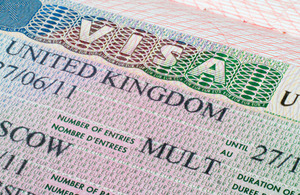FOI request reveals nobody has applied in six months since route was launched
New Scientist reported on Monday that the new fast-track Global Talent visa route for prestigious award winners has so far failed to attract a single application by anymore working in the fields of science, engineering, the humanities or medicine.
 Image credit: UK GovernmentThe Home Office announced the opening of the new route in May. It allows individuals who have received one of a list of recognised awards (such as a Nobel Prize or a Turing Award) to fast track their visa application under the Global Talent route. Home Secretary Priti Patel said the new route was doing exactly what the post-Brexit new point-based immigration system was designed for: "attracting the best and brightest based on the skills and talent they have, not where they've come from."
Image credit: UK GovernmentThe Home Office announced the opening of the new route in May. It allows individuals who have received one of a list of recognised awards (such as a Nobel Prize or a Turing Award) to fast track their visa application under the Global Talent route. Home Secretary Priti Patel said the new route was doing exactly what the post-Brexit new point-based immigration system was designed for: "attracting the best and brightest based on the skills and talent they have, not where they've come from."
Using a freedom of information (FOI) request, New Scientist revealed that nobody has so far applied in the six months since the route was launched.
Nobel Prize winner Andre Geim from the University of Manchester told the New Scientist: "The scheme itself is a joke – it cannot be discussed seriously. The government thinks if you pump up UK science with a verbal diarrhea of optimism – it can somehow become a self-fulfilling prophecy."
Geim added that he believed there was zero chance that a Nobel or Turing laureate would move to the UK to work over the next decade or so.
Labour's Chi Onwurah, the shadow minister for Science, Research and Digital, said the new route was "just another gimmick from a government that over-spins and under delivers."
The Home Office said, however, that the fast track route for prestigious award winners was "just one option under our Global Talent route, through which we have received thousands of applications since its launch in February 2020 and this continues to rise."
The New York Times reported yesterday that wealthy nations are facing increasingly stiff competition as they try to attract skilled migrants in the wake of Covid-19's disruption of labour markets and international travel.
Parag Khanna, an author and strategist, told the New York Times: "It's a war for young talent."
The New York Times notes that the pandemic has slowed down labour migration, created more competition for workers, and led to a general easing of the rules on work for existing migrants.
"Many countries, including Belgium, Finland and Greece, granted work rights to foreigners who had arrived on student or other visas. Some countries, such as New Zealand, also extended temporary work visas indefinitely, while Germany, with its new Immigration Act, accelerated the recognition process for foreign professional qualifications. In Japan, a swiftly graying country that has traditionally resisted immigration, the government allowed temporary workers to change employers and maintain their status," the New York Times said.
Jean-Christophe Dumont of the Organization for Economic Cooperation and Development (OECD) explained that Covid has been an accelerator of change.
Dumont said: "Countries have had to realize the importance of migration and immigrants … Across the OECD, you saw countries treat the immigrant population in the same way as the rest of the population."
"We're hearing the same thing from everywhere … If you want to attract new workers, you need to offer them attractive conditions", Dumont added.